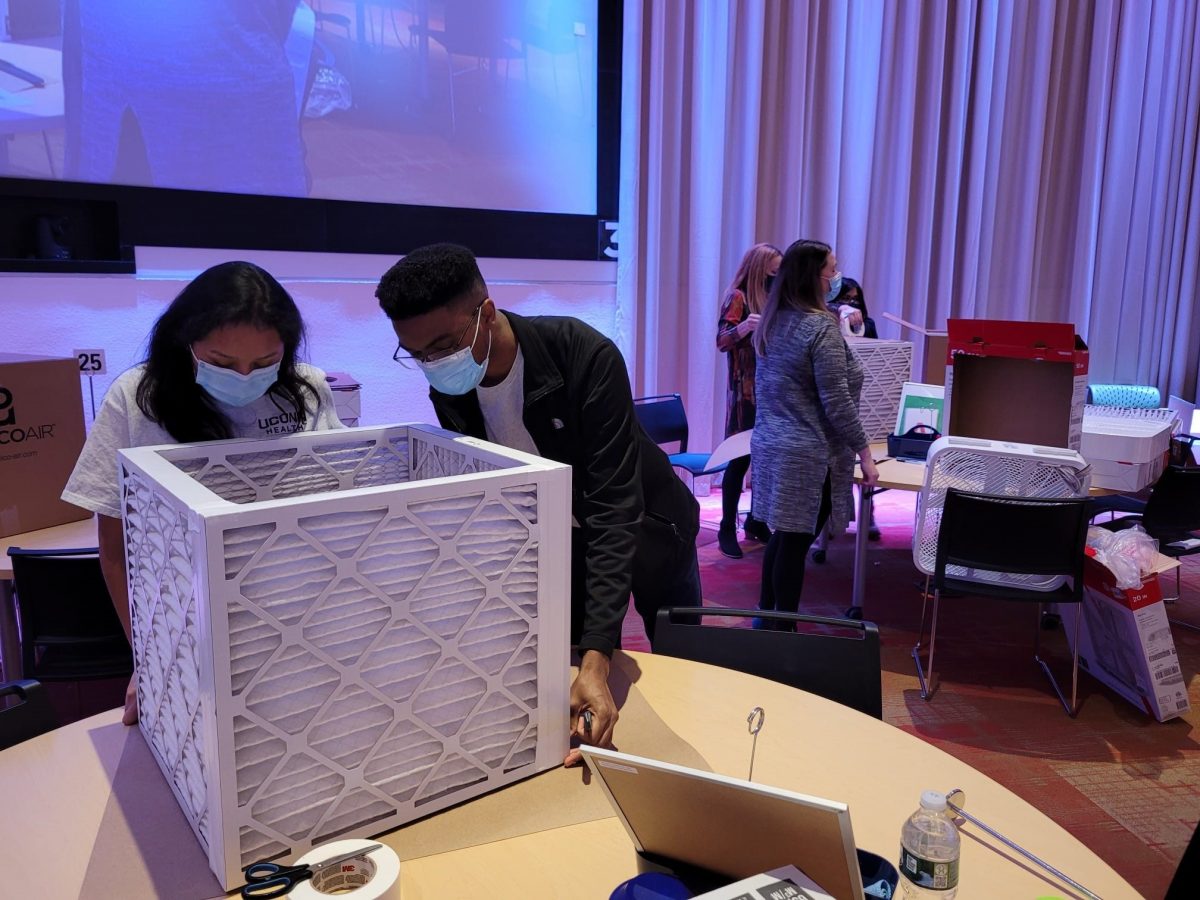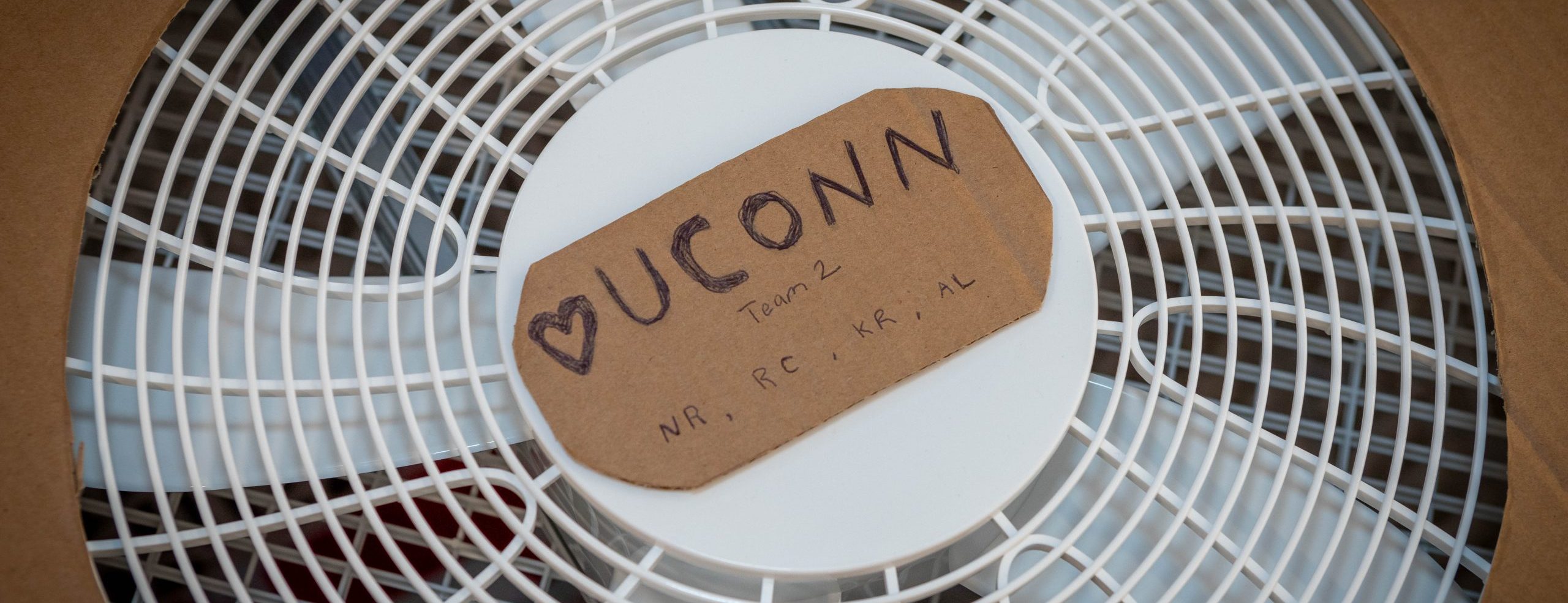Last week Environmental Protection Agency (EPA) scientists started testing “Owl Force One,” a low-cost, do-it-yourself “Corsi-Rosenthal” box air purifier that can protect against infectious aerosols, like the virus that causes COVID-19. The testing is taking place at the EPA Homeland Security Division Laboratory’s high-tech, advanced biochamber, UConn Health announced. “We’re here to test ‘Owl Force One’ against MS2. A student from Connecticut has created this box with her classroom of fifth graders.
Corsi-Rosenthal Boxes
UConn Researchers Come to Triangle to Test Air Filters that Could Reduce COVID-19 Particles
MORRISVILLE, NC – The University of Connecticut is spending a week at the Environmental Protection Agency campus at the Research Triangle Park to test the efficacy of the Corsi-Rosenthal air filter in reducing Covid particles from the air. From UConn, Marina Creed is leading the all-women group of researchers to test the filter in a controlled setting for the first time.
“We saw that the concentrations of particles were reduced quickly in the chamber, and we’re looking forward to getting the microbiology results that will be out in the coming weeks,” said Creed.
Creed’s formally trained as a nurse practitioner, and she says that it’s her experience working during the coronavirus pandemic that prompted her into action. She formed the multi-disciplinary Indoor Air Quality Initiative at UConn to test the low-cost, do-it-yourself Corsi-Rosenthal air filters. Team members Dr. Kristina Wagstrom and Dr. Misti Levy Zamora joined Creed to work with the EPA lab for the week.
Social Media and Duct Tape are Helping People Make DIY Air Purifiers That Filter Out Wildfire Smoke
NEW YORK (AP) — Social media users are sharing a surprisingly effective way to protect yourself indoors from the toxic wildfire smoke blanketing much of the East Coast: a box fan, four air filters and a whole lot of duct tape.
As searches for “air purifiers” spike on Google, people are posting on TikTok and Facebook about how to build the DIY air purifier. The technique, known as the Corsi-Rosenthal method, has gained attention in recent years amid the pandemic and raging western U.S. wildfires.
As Toxic Wildfire Smoke Lingers, Americans Are Turning to DIY Air Purifiers
NEW YORK — Social media users are sharing a surprisingly effective way to protect yourself indoors from the toxic wildfire smoke blanketing much of the East Coast: a box fan, four air filters and a whole lot of duct tape.
As searches for “air purifiers” spike on Google, people are posting on TikTok and Facebook about how to build the DIY air purifier. The technique, known as the Corsi-Rosenthal method, has gained attention in recent years amid the pandemic and raging western U.S. wildfires.
UConn students built an air purifier — Here’s how they did it
A fifth-grade class at Noah Webster MicroSociety Magnet School will be building do-it-yourself air filters out of furnace filters, a box fan and its box. The finished product will be taken to the Whitehouse in Washington D.C. to be presented by Marina A. Creed, a family nurse practitioner, UConn Health. One was presented to the Office of Science and Technology Policy for the White House on Sept. 9, 2022.
Take four air filters, like you use in your furnace. Tape them together so they form a cube.
Buy a box fan of the same size — 20 by 20 inches — and attach it to the top of the cube. Don’t throw away the box but use one side of it as the bottom of the cube, the other on top of the fan with a hole cut in the round shape of turning fan blades.
DIY Air Filtration Systems Help Clear The Air in Connecticut Public Schools
 Gov. Ned Lamont announced last week that his administration will release $150 million to help upgrade heating, ventilation and air conditioning systems in Connecticut public schools to improve air filtration.
Gov. Ned Lamont announced last week that his administration will release $150 million to help upgrade heating, ventilation and air conditioning systems in Connecticut public schools to improve air filtration.
But medical staff and scientific researchers working on the University of Connecticut’s Indoor Air Quality Initiative say schools can improve the quality of their air with a $64 purchase at their local hardware store.
The program – led by Marina Creed, a nurse practitioner at the UConn Health Comprehensive MS Center – has already provided 200 so-called ‘Corsi-Rosenthal boxes’ to Coventry public schools, 100 to elementary school cafeterias in West Hartford, 10 at the Hartford Public Library and more at the South Park Inn Shelter in Hartford.
Read More @ CT News Junkie
UConn Indoor Air Quality Initiative, Funded Through Cryptocurrency, Works to Protect Schools from Spread of COVID-19
 COVID-19 cases may be falling, but the virus is still a very real concern for many parents sending their children back to school. UConn researchers are working to ease those worries by building do-it-yourself air purifiers to improve health in schools and other crowded settings. The Indoor Air Quality Initiative, which has already made an impact in Connecticut, is growing, thanks to a generous donation.
COVID-19 cases may be falling, but the virus is still a very real concern for many parents sending their children back to school. UConn researchers are working to ease those worries by building do-it-yourself air purifiers to improve health in schools and other crowded settings. The Indoor Air Quality Initiative, which has already made an impact in Connecticut, is growing, thanks to a generous donation.
The initiative has received a $300,000 grant, funded through cryptocurrency, from Balvi, an investment and direct giving fund established by Vitalik Buterin, the co-creator of Ethereum. Ethereum is a technology for building computer applications and organizations, holding assets, transacting, and communicating without being controlled by a central authority. Balvi was established for the purpose of deploying funds quickly to high-value COVID-19 projects that traditional institutional or commercial funding sources tend to overlook.
“Improving the quality of indoor air is a key tool for dealing with covid and future pandemics without any disruption to normal life,” says Buterin. “We are excited to support grassroots initiatives to improve air quality in schools and other public venues.”
The donation will allow UConn to expand the project’s reach and add to the more than 400 purifiers already in schools, libraries, shelters, and other locations throughout the state.
Clearing the Air: UConn School of Nursing donates air purifiers to Coventry schools

COVENTRY — Since the COVID-19 pandemic began, many schools with aging ventilation systems have struggled to remove virus-carrying particles from the air. The University of Connecticut School of Nursing has devised an innovative solution, however, that was being installed today in Coventry schools.
Some 150 do-it-yourself air purifiers, known as Corsi-Rosenthal Boxes, built by university students on the Storrs campus over the weekend, were donated to Coventry schools to help them properly ventilate indoor spaces. The purifiers are built from commonly found materials, such as a box fan, air filters, cardboard, and duct tape, said Mikala Kane, UConn School of Nursing spokeswoman.
“I was pretty excited to have this opportunity come this way,” Coventry Superintendent David Petrone said last week. “It’s no secret that our (ventilation) systems are on the older side of things.” There’s no cost to the town for the air purifiers, which come as a result of a partnership between the school district and the university started seven years ago, he added.
“This is a very simple unit that costs about $60 that students, adults, teachers and even our students here at UConn can make, using just these simple materials,” said Marina Creed, a nurse practitioner with UConn Health who spearheaded the initiative with Michelle Cole, an associate clinical professor with the university’s School of Nursing.
Clearing the Air: UConn School of Nursing donates air purifiers to Coventry schools
COVENTRY — Since the COVID-19 pandemic began, many schools with aging ventilation systems have struggled to remove virus-carrying particles from the air. The University of Connecticut School of Nursing has devised an innovative solution, however, that was being installed today in Coventry schools.
Some 150 do-it-yourself air purifiers, known as Corsi-Rosenthal Boxes, built by university students on the Storrs campus over the weekend, were donated to Coventry schools to help them properly ventilate indoor spaces. The purifiers are built from commonly found materials, such as a box fan, air filters, cardboard, and duct tape, said Mikala Kane, UConn School of Nursing spokeswoman.